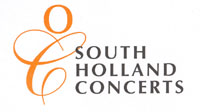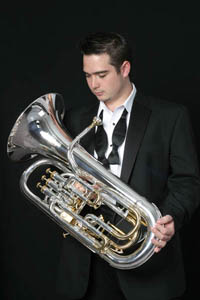Programme Details
Hermaiden's Dance (Valflickens Dans) - Hugo Alven
(1872-1960)
Morceau de Concours - Joseph Edouard Barat (1882-1963)
Sonata Brevis - Rodney Newton
Skunk - Simon Parkin
Irish Tune from County Derry and The Sussex Mummers' Carol - Percy
Grainger (1882-1961)
Lento from Concerto for Euphonium - Joseph Horovitz (b.1926)
Fantasy - Johann N. Hummel (1778-1837)
INTERVAL
Introduction, Theme and Variations - Gioacchino Rossini (1792-1868)
Hear My Prayer - Felix Mendelssohn (1809-1847)
Nocturne op.55 no.1 in F minor - Frédéric Chopin (1810-1849)
Arioso & Allegro - Joseph-Hector Fiocco (1703-1741)
Carnival of Venice - Paganini/Arban
Hermaiden's Dance (Valflickens Dans) - Hugo Alven (1872-1960)
This piece, originally composed as an orchestral piece
by Hugo Alven mainly featuring the violin section, is a work of amazing
flare and technical display. In its original form it lasted for approximately
four minutes. However, in the arrangement we are to hear tonight, made
by Dr. Robert Childs (David's father and a distinguished musician well
known in the brass band world), material is taken from the beginning
and the end of the original work to make an exciting and impressive
introduction to the concert.
Morceau de Concours - Joseph Edouard Barat (1882-1963)
Joseph Barat was a student of French composer Paul Vidal.
Vidal, himself a pupil of César Franck, was an eminent conductor
at the Opéra Comique in Paris. Barat's main occupation was as
bandmaster with the French army, and during his long career he produced
many fine works for wind instruments and orchestra. Most frequently
heard is his Andante & Scherzo for trombone and orchestra written
in 1935 for performance at the Paris Conservatoire.
Throughout the Paris Conservatoire's illustrious history
many fine musical works written by well-known composers and performers
(and originally intended as student test pieces) have subsequently found
their way into the established repertoire and concert programmes. Tonight
we hear one such piece, Joseph Barat's Morceau de Concours, written
late in his career in 1957 and conceived originally for the Saxhorn.
The Saxhorns are a family of valved brass instruments
developed by Adolphe Sax in France in the mid-nineteenth century. In
England, only two instruments of the family are now in common use -
abbreviated commonly to Tenor Horn and Baritone.
This piece is dedicated to J. Balay, a famous Paris soloist.
Sonata Brevis - Rodney Newton
(The following note on this piece has been kindly contributed by the
artist)
This work was written in January 2003 especially for David
Childs and may be considered as an exercise in compression. It is cast
in classical sonata form but lasts for only five minutes. The material
is based on a sequence of twelve chromatic notes. However, despite these
notes undergoing the usual inversions and retrogrades associated with
dodecaphonic technique, this is not a serial composition. The series
and its transformations are used more in the way of modes and all the
harmonic and melodic material may be traced back to the original twelve-note
row.
The first movement, Allegro Energico, is in traditional
sonata form with a craggy exposition, a more lyrical second subject,
a short development, a recapitulation and the briefest of codas (a mere
two bars).
The second movement, Molto Moderato, is a chaconne and,
again, is in the traditional form used by Purcell and Bach.
The third movement, Molto Vivace, is a very short, high-spirited
rondo, lasting just one minute.
Skunk - Simon Parkin
Simon Parkin is well known to audiences as a pianist and
chamber musician, especially as a duo partner with wife, the cellist,
Hannah Roberts (who played for South Holland Concerts in March 1993).
Born in Manchester, Parkin now teaches composition at the Royal Northern
College of Music. He has had many of his compositions (including a Cello
Concerto for his wife) widely performed, and his varied genre has embraced
chamber, choral and operatic work. He has a special interest in the
interaction of jazz and 'pop' styles with classical traditions and he
is frequently heard in the performance of contemporary repertoire.
Skunk was composed in 2001 and David Childs gave the first
performance, partnered by the composer, at the 2001 Festival of Brass
held at the Royal Northern College of Music. As an interesting rhythmical
piece which has had audiences' feet tapping, Skunk explores many of
the technical and lyrical possibilities of both euphonium and piano.
At the end, following the return of initial material, the piece comes
to an abrupt finish with a series of fortissimo pedal tones.
Irish Tune from County Derry and The Sussex Mummers'
Carol - Percy Grainger (1882-1961)
(Solo Piano - Harvey Davies)
Percy Grainger was born in Victoria, Australia. He was
an exceedingly talented pianist at an early age and, following a period
of study in Frankfurt, he settled temporarily in London in 1901. It
was during this period, before finally emigrating to the United States
in the First World War, that Grainger became absorbed in collecting
and arranging the folk songs and melodies of the British Isles.
Irish Tune from County Derry is based on a melody originally
collected by a certain Miss J. Ross of County Kerry in Ireland, and
this setting was made by Grainger in 1909. The piece is dedicated to
the memory of Edvard Grieg with whom Grainger had become close friends.
The Sussex Mummers' Carol dates from approximately the same period,
and both settings were later re-worked by the composer for a variety
of vocal and instrumental groupings.
Lento from Concerto for Euphonium - Joseph Horovitz
(b.1926)
Viennese-born Joseph Horovitz settled in England in 1938
and studied composition with Gordon Jacob at the Royal College of Music.
He became well respected as a conductor of ballet and opera, joining
the staff of Glyndebourne Opera in 1956. Now a distinguished composer,
he is a Fellow of the Royal College of Music and has been Professor
of Composition there since 1961. His numerous works include concertos
for many different instruments, string quartets, choral and operatic
scores, as well as music for TV and theatre.
The Concerto for Euphonium dates from 1972 and is regarded
as the first substantial concerto written for the instrument. It was
first performed by Trevor Groom and the GUS Footwear Band at London's
Royal Albert Hall. This concerto is frequently performed, perhaps partly
due to the exceptionally beautiful and lyrical melodies of the work's
popular second movement - Lento. It is certainly considered one of the
most attractive pieces of original music in the euphonium's growing
repertoire.
Fantasy - Johann N. Hummel (1778-1837)
In his lifetime, Austrian-born Johann Hummel was considered
one of Europe's finest composers and pianists. A prolific composer,
he is remembered today largely for delightful chamber works and concerti
for various instruments. The 'Fantasy' was a popular form of music in
the eighteenth century, consisting mainly of a potpourri of hit tunes
of the day.
Originally written for the clarinet or viola and incorporating
the melody of the Mozart's aria "Il Mio Tesoro" from his opera
Don Giovanni, this version is arranged and edited for euphonium by Robert
Childs and Philip Wilby.
INTERVAL
Introduction, Theme and Variations - Gioacchino Rossini
(1792-1868)
(arr. David Childs)
So important was Rossini in the Italian musical and operatic world of
his day, that no other living composer (until the advent of Verdi) enjoyed
a similar measure of wealth, influence and prestige. However, the immense
popularity of Rossini's many successful operas has always tended to
over-shadow his other compositions, many of which are both delightful
and poignant. For example, audiences are frequently entranced by the
grace and lightness of his early String Symphonies and by the sheer
accessibility and lack of morbidity in the ever-popular Petite Messe
Solennelle from his mature years.
It is in the period of his youth (he was only eighteen)
that the composer wrote his Introduction, Theme and Variations, and
this largely light-hearted work (almost certainly originally conceived
for the clarinet) displays all the confident assurance of his later
years. After the introduction and the soloist's dashing entrance, the
tuneful main theme is followed by five formal variations, each one adding
more layers of elaboration and technical difficulty.
Hear My Prayer - Felix Mendelssohn (1809-1847)
(The following note on this piece has been kindly contributed by the
artist:)
The lyrical simplicity of its melodic line combined with
the plea of the title makes this one of the most intimate of Mendelssohn's
works. Originally composed for soprano voice and choir, the prayer is
always a dialogue between the individual and the Creator. In this arrangement
for solo euphonium & piano, the popular and famous melody, O for
the Wings of a Dove forms the final part of the work.
Nocturne op.55 no.1 in F minor - Frédéric
Chopin (1810-1849)
Chopin's much loved piano Nocturnes span practically his
entire lifetime as a mature musician. The earliest in E minor (op.72
no.1), numbered and published after his death, dates from around 1827,
and the final two Nocturnes op.60 date from 1846.
During Chopin's lifetime these Nocturnes were among the
most popular of his piano compositions, having degrees of harmonic daring
that set him well apart from other piano composers of the time. As a
piano virtuoso, Chopin's imagination in keyboard composition was never
dull. For example, in many of these characteristic pieces the main melody
is to be found in an inner part - almost hidden within decorative piano
figuration above and below it.
Since many of these delightful works are dedicated to
various ladies of Chopin's acquaintance, it has been suggested that
they could perhaps be perceived as some of his most private and eloquent
love letters! This Nocturne we are to here tonight is one of a pair
written in Paris in 1844 (the same year as the Sonata in B minor) at
the time when the composer was conducting a love affair with the famous
novelist, George Sand.
Arioso & Allegro - Joseph-Hector Fiocco (1703-1741)
(arr. Robert Childs)
Fiocco was born in Brussels into a musical family. As
an organist and harpsichordist he was strongly influenced by the music
of Couperin, whose music he admired. As well as the French master's
influence in his music, we can detect a thorough grounding in the early
Italian styles - particularly, perhaps, that of Vivaldi.
Fiocco's Allegro (and the lyrical Arioso movement that
precedes it), was originally written for harpsichord. In this arrangement
by Robert Childs for euphonium, we have a piece that explores the wide
compass and dynamic range of the instrument. The Arioso demonstartes
beautiful mellow tones and colours, while the busy Allegro is technically
challenging.
Carnival of Venice - Paganini/Arban
(arr. David Childs)
Joseph Arban was a well-known cornet and trumpet player
in 19th century Paris. A respected teacher at the Paris Conservatoire,
his reputation was strengthened by his systematic approach to instruction
embodied in his Grande Méthode Complète - a tutorial still
in use today. His setting of Carnival (a Venetian melody that has probably
been known for a few hundred years) is a virtuoso piece that has been
readily adapted by players of other brass instruments and requires a
delicacy of attack combined with a daring panache.
The violinist Paganini also used the melody as the basis
of a sensational set of variations to demonstrate his phenomenal technique.
The Victorians loved this piece, and numerous player/composers have
subsequently made enjoyable, if sometimes curious, arrangements. (The
varied list included settings for piano accordion and a rather splendid
high-flying one for piccolo!) This arrangement for euphonium is bound
to delight!
Programme notes and articles by Peter Case for South
Holland Concerts.
We are grateful to the artist for specialised information
included in some of the above notes.

